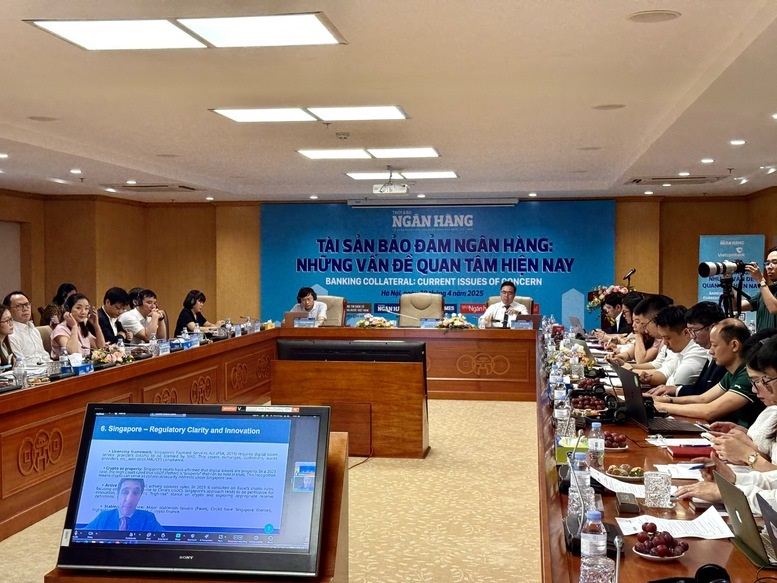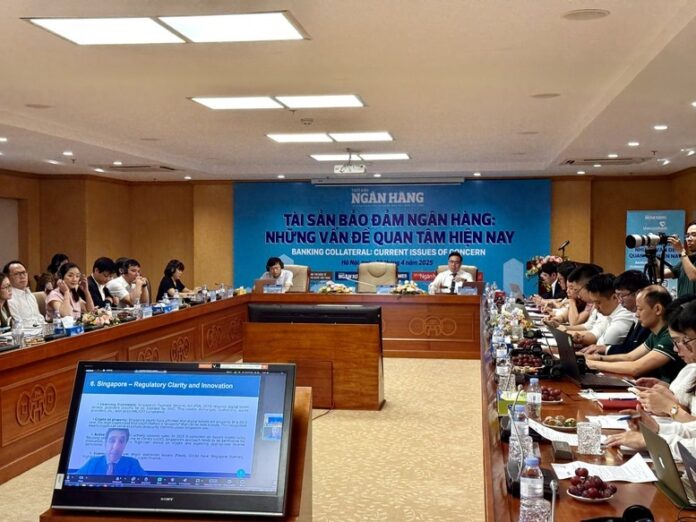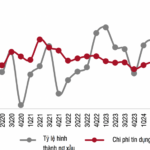
Banking Times hosts a seminar on “Bank Secured Assets – Current Concerns” – Photo: VGP/HT
|
On April 28, in Hanoi, the Banking Times organized a seminar on “Bank Secured Assets – Current Concerns,” attracting nearly 100 delegates, including experts, policymakers, and financial institution representatives. They discussed the legal framework for digital assets and carbon credits.
Research on recognizing digital assets and carbon credits as secured assets
As Vietnam’s economy continues its strong development and deep integration with the region and the world, the government and prime minister have issued numerous policies to promote digital transformation in the banking sector and develop a green and circular economy. This includes decisions related to digital assets and carbon credits, such as Decision No. 411/QD-TTg dated March 31, 2022, approving the National Strategy for Digital Economy and Digital Society Development by 2025, with orientations towards 2030; Decision No. 1437/QD-TTg dated November 20, 2024, of the Prime Minister issuing the National Action Plan for Digital Economy Development in the period of 2024 – 2025; and Decision No. 232/QD-TTg dated January 24, 2025, of the Prime Minister approving the Proposal to establish and develop a carbon market in Vietnam. These are typical examples demonstrating the government’s determination in shaping the ecosystem for emerging asset classes such as digital assets and carbon credits.
In the banking sector, following Directive No. 05/CT-TTg dated March 1, 2025, of the Prime Minister, the State Bank of Vietnam is coordinating with the Ministry of Finance to urgently research and propose a legal framework for managing and promoting the development of digital assets and digital money. This is an important step towards creating a clear and transparent legal corridor for this field, while also promoting innovation and ensuring a safe investment environment.
The rapid development of the digital economy, along with the global green transition trend, has fundamentally transformed the landscape of the financial market. In this context, digital assets and carbon credits have emerged not only as new business tools but also as assets with tremendous economic value. However, when compared to traditional assets such as real estate, machinery, and securities, the legal framework for digital assets and carbon credits in Vietnam remains undeveloped.
In reality, some countries have recognized digital assets as secured assets, and Vietnam is in the initial stages of defining and establishing the legal framework for this type of asset. This reflects the necessary caution in controlling risks. However, if we delay, we may miss the opportunity to exploit these valuable assets for the development of a green and digital economy.
According to Dr. Le Thi Giang from the University of Law, the current legal system only defines assets through enumeration (Article 105 of the 2015 Civil Code) without extending it to include digital assets or carbon credits. As a result, in practice, while digital assets exist and are commonly traded, there is still insufficient legal basis for them to become secured assets in bank credit transactions.
Additionally, as pointed out by many experts at the seminar, the absence of a legal framework not only makes banks hesitant to accept digital assets as collateral but also creates difficulties in valuing and handling these assets when risks arise. Therefore, it is imperative to promptly improve the law to recognize and regulate digital assets and carbon credits in bank credit activities.
International experience should be considered
In the journey of building a legal framework for new secured assets, international experience offers valuable lessons.
Dr. Giacomo Merello cited the case of Switzerland, which became the first country in the world to allow digital assets such as Bitcoin and Ethereum to be used as collateral at the SIX Swiss Exchange. This not only broke new ground in diversifying secured assets but also solidified Switzerland’s position as a leader in financial innovation. In February 2025, SIX launched the Digital Collateral Service, enabling institutions to use cryptocurrencies (BTC, ETH) as collateral alongside traditional securities.
This solution reduces counterparty risk and optimizes operations. Banks like Bitcoin Suisse offer crypto-backed loans. Customers can use various crypto assets (BTC, ETH, DOT, USDC, etc.) as collateral for fiat currency loans, with the assets securely stored in cold wallets. This reflects Switzerland’s robust crypto custody and risk management capabilities.
Similarly, Singapore, through the Payment Services Act (PSA) enacted in 2019, established a transparent legal framework for digital asset exchanges and custodial service providers. Going a step further, Singapore recognized digital tokens as collateral, paving the way for a host of innovative financial products.
The Monetary Authority of Singapore (MAS) continuously updates regulations. In 2025, MAS consulted on crypto regulations by Basel, focusing on stablecoins like USDC by Circle. Singapore’s approach is typically flexible to foster innovation, softening Basel’s “high-risk” view of crypto…
Malta, with its ambition to become the “Blockchain Island,” has also been a pioneer in enacting the Virtual Financial Assets Act and actively promoting the tokenization of financial debts.
Malta is considering licensing crypto banks and other innovative services, demonstrating an open attitude towards integrating digital assets into the banking sector.
Dr. Giacomo Merello observed that approximately 17 million Vietnamese held digital assets as of 2024, with a market value of over $100 billion. Vietnam ranks 5th globally in crypto interest and 3rd in exchange usage, indicating strong domestic demand.
Vietnam is crafting a legal framework for crypto. The draft law has defined “digital assets” and plans to establish a fintech sandbox (financial center) where licensed crypto trading can commence (expected around July 2026). This approach mirrors many countries that have adopted special zone models.
Along with the advantages, Vietnam also faces challenges, including addressing anti-money laundering, counter-terrorist financing (AML/CFT), and tax requirements (e.g., the proposed 0.1% tax on crypto transactions). Regulators need to balance innovation promotion with banking system protection through collateral transparency and loan-to-value (LTV) monitoring.
“Only with a clear, transparent, and timely legal framework that keeps pace with technological trends can we maximize the potential of digital assets and carbon credits in the banking sector while managing associated risks,” said Dr. Giacomo Merello.
Based on the current situation and international experience, Dr. Le Thi Giang from the University of Law put forward practical suggestions for building a suitable legal framework for Vietnam.
First, it is necessary to establish the legal status of digital assets and carbon credits in the Civil Code clearly. Including the concept of digital assets in the law will pave the way for recognizing them as objects of secured transactions, moving beyond the scope of traditional assets as defined currently.
Second, in addition to amending the Civil Code, it is crucial to revise and supplement Decree 21/2021/ND-CP on secured transactions. This involves detailing the methods of pledging and depositing digital assets and carbon credits while providing guidance on custody, valuation, and handling procedures for these assets.
Third, develop a separate set of valuation standards for digital assets and carbon credits in credit transactions. Due to their highly volatile nature, the valuation of digital assets differs significantly from that of typical physical assets. Independent valuation organizations with specialized expertise in digital assets and green finance should be licensed and authorized.
Experts believe that Vietnam needs to establish a sandbox mechanism (controlled experimentation) in the field of digital assets and carbon credits. This allows new models to be tested in a safe legal environment, gradually adjusting regulations to fit reality without risking the financial system. In the long term, promote international cooperation on mutual recognition of digital assets and carbon credits, especially in cross-border transactions. This will enable Vietnamese banks to access not only domestic capital but also international cooperation and capital mobilization opportunities.
– 12:47 28/04/2025
The Ho Chi Minh Stock Exchange witnessed another day of net foreign buying, with VIC shares being the most accumulated.
The markets are buzzing with activity as intraday trading volume reaches a whopping 20.5 trillion VND. Foreign investors showed a keen interest, with a net buy of 246 billion VND, primarily accumulating VIC, MBB, HPG, MSN, DXG, CTG, and HCM stocks, while offloading VHM.
Clearer Criteria Needed to Distinguish Between Three Types of Digital Assets: Virtual, Crypto, and Other Digital Possessions.
“During the afternoon session on May 9, discussions on the draft Law on Digital Technology Industry, pertaining to regulations on digital assets, took place. National Assembly Deputy Dong Ngoc Ba proposed a clearer distinction between three groups of digital assets: virtual assets, encrypted assets, and other digital assets.”
The End of the Road for Gas Guzzlers: A Line-Up of Fuel-Powered Cars Faces the Axe
The automotive industry is facing a significant shift with the implementation of upcoming fuel consumption limits. Manufacturers and dealers must adapt to these changing standards or risk having their vehicle models taken off the market. This development will undoubtedly impact a wide range of car and motorcycle designs, urging a necessary evolution in the industry.





















